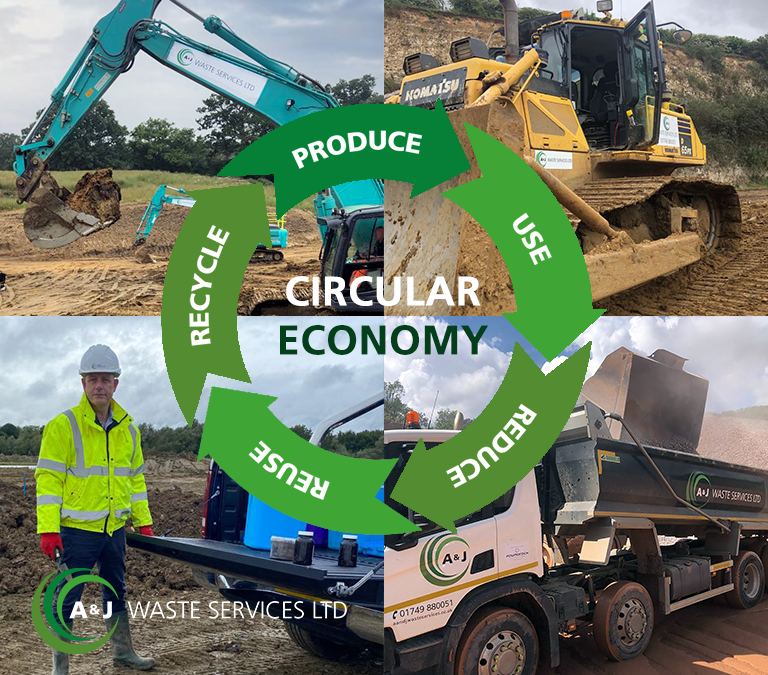With an estimated 20 million tonnes of soil sent to UK landfill sites every year, and the UK government stating that improving soil health is a priority, we look at what steps are being taken to reduce this figure as part of their broader environmental and waste management strategies.
As well as improving our soil health, these efforts are largely driven by policies aimed at promoting the circular economy and minimising environmental impacts. A & J Waste Services aligns its services with this approach, strongly endorsing circular economy and legitimate soil reuse wherever possible. So let’s look at some of the government’s current key initiatives and regulatory measures. Our experienced Environmental Technical Team are aligned with all these criteria, and is available to help you develop a Materials Management Plan to ensure that you are too:
Landfill Tax
The UK government has implemented a Landfill Tax, which imposes a financial penalty on the disposal of waste, including soil, in landfills. This tax has been steadily increasing over the years to discourage landfill use and encourage waste producers to seek alternative solutions such as recycling or reuse. As of April 2024, the standard rate for the Landfill Tax is £103.70 per tonne, which creates a significant financial incentive to divert soil from landfills. However, inert or inactive waste is subject to the lower rate of £3.30 per tonne.
Environmental Improvement Plan (EIP)
In 2018, DEFRA introduced their 25-year environment improvement plan – the EIP. With a strong emphasis on soil health, one of its objectives is to improve the management of soil to prevent degradation and promote its reuse in construction and other industries. The EIP encourages sustainable practices that keep soil out of landfills, such as better soil management, on-site reuse, and the adoption of remediation technologies.
Waste Hierarchy Promotion
The UK government promotes the waste hierarchy, which prioritises waste prevention, reuse, and recycling over disposal. This hierarchy is enshrined in legislation and policy, encouraging businesses and local authorities to find ways to reuse or recycle soil rather than send it to landfill. The government’s push for a circular economy also aligns with these principles, aiming to keep resources in use for as long as possible.
Regulations on Contaminated Soil
The government has stringent regulations governing the disposal of contaminated or hazardous soil. These regulations require thorough testing and classification of soil before disposal, ensuring that only soil that cannot be safely reused or treated ends up in landfills. This regulatory framework also supports the development of technologies and processes that can remediate contaminated soil, making it suitable for reuse.
Incentives for Sustainable Construction
Through various programs and initiatives, the government encourages the construction industry to adopt sustainable practices, including the reuse of soil. For example, building regulations and planning policies increasingly favour developments that minimise waste and incorporate sustainable land use. This is often tied to broader goals such as reducing carbon emissions and protecting biodiversity.
As a principal member of CL:AIRE, we are proud to share in their commitment to sustainable land reuse and development. CL:AIRE is an independent body that promotes the sustainable remediation of contaminated land and groundwater. As part of its work, it has developed a Definition of Waste Code of Practice (DoWCoP) to provide a clear, consistent and efficient process to reuse excavated material without it being classified as waste.
This isn’t an exhaustive list, but we can see that the government’s efforts to prevent soil from being landfilled involve a combination of taxation, regulation, and incentives to encourage better soil management and reuse. By promoting sustainable practices, investing in new technologies, and enforcing stricter regulations on contaminated soil, the government aims to significantly reduce the amount of soil waste and support the broader goals of environmental protection and resource efficiency.
The professional team at A & J Waste Services keeps abreast of all legislation as it evolves and offers an end-to-end service to its clients on all areas of Materials Management and Environmental Consultancy. We work all over the South/South West of the UK with clients from the Construction, Development and Utilities industries, providing services which include:
- Soil Waste Management
- Aggregates & Soils
- CL:AIRE Applications & Project Management
- Site Investigation, Soil Testing & Analysi
- Waste Classification
- Earthworks Projects
- Contaminated Land Assessment & Remediation
- Environmental Consultancy & Planning
- Waste Disposal, Recovery & Recycling.
Please see what our clients say about us here https://aandjwasteservices.co.uk/us/our-clients/ and get in touch today by calling one of our helpful team on 01749 880051 (there’s a link at the top right of this page).


